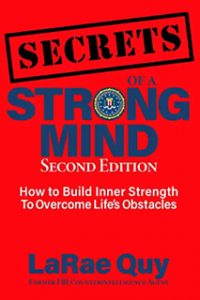FBI agents are trained to read other people and uncover what is hidden so they can get to the truth of a situation. Their job is to recognize language inconsistencies and other verbal cues to spot liars and deceptive behavior.
It would be nice if every job candidate, negotiating partner, and supplier told the truth—but they do not. In addition, many business owners and entrepreneurs get embezzled by the employees they trust.
Often your success relies upon your ability to spot liars and identify people who are deceptive. How do you know when someone is telling you the truth? And if you do believe something you are told, how can you be sure it’s not because you want it to be true?
Here are 10 FBI tips on how to spot the liar:
1. Build Rapport
Coming across as empathetic in a conversation gets the person to open up more than when the interviewer is cold and accusatory. Rapport building is the root of effective communication. In fact, without rapport, no one will be interested in your message. Without rapport, you have little chance of getting to the bottom of the situation.
TIP: Practice ways you can mirror and match another person’s behavior. When you match and mirror, you observe with your entire body. This is not mimicry. It’s learning to tune in with another person. Pay attention to their body posture, energy level, and voice.
2. Watch Out For The Perfect Story
Ask the person to tell you their side of the story or explain the circumstances. Ask them to do this more than once. An honest person will recollect more details as their memory is triggered and they won’t be hesitant to add those details to their narrative. A guilty person will repeat the same story, time after time, because they’ve memorized their response.
TIP: Pause every so often or leave out details. Allow the other person an opportunity to fill in what you’ve left out. Since liars have a prepared narrative in their minds, they’ll correct you when say something that is contrary to their version of the story. Those are the areas into which you will want to delve deeper.
3. Surprise Them
The person knows they are guilty and will be prepared for your questions. If you ask them something they do not expect, they will usually stumble when put on the spot.
TIP: Ask unexpected questions. This could put them in a tough spot because they’ll have to stop and think about how to add another detail to their story. Watch for signs of anxiety or hesitation. Better yet, ask the same question in different ways. Liars prefer to stick to their rehearsed answers and specific words because that is how they’ve memorized their responses.
4. Ask For The Story Backward
This is one of my favorite techniques.
Since truthful people tend to add details and remember facts the more they repeat their story, it’s not a problem for them to tell their story backward. Liars, on the other hand, memorize their stories and keep them the same. To tell the story backward can easily confuse them.
TIP: For example, start at the end and then ask them to explain what happened right before that point. And so on…For truthful people, this makes recall easier. For liars, they tend to simplify the story so they don’t contradict themselves.
5. Withhold Evidence
Don’t show your hand at first. Start with empathy: nod your head or suggest that it isn’t really much of a big deal if they admit to it. Give them an opportunity to confess and tell the truth, but if they don’t, you will need to confront them. They’ll have a hard time editing out all the details they’ve had to add as you followed the above steps.
TIP: If confronted with evidence of guilt too early, the person will either clam up or become hostile. Instead, give them the opportunity to make a confession. If they don’t, allude to evidence in such a way that they realize you know the facts.
6. Listen More Than You Talk
Liars tend to talk more than truthful people in an attempt to sound legitimate and win over their audience. Liars also tend to use more complex sentences to hide the truth.
TIP: Here are some other things to look for:
- Stress usually increases the speed of speech.
- A stressed person may also talk louder.
- Cracking in the natural tone of the voice often occurs at the point of deception.
- Coughing and clearing the throat are good signs of tension at the point when they occur.
7. NO Is A Key Word
A person is most likely showing deceptive behavior when they:
- Say “no” and look in a different direction (upward, downward, etc)
- Say “no” and close their eyes
- Say “no” after a hesitation
- Say “noooooooo” stretched over a long period of time
- Say “no” in a singsong manner
8. Be Wary Of Compliments
Watch out for someone who is trying too hard to make a good impression:
- Emphasizing respect for your qualities and talents
- Forming a mutual bond by reminding you of common friends and activities you share
- Offering lots of praise and pleasantries
- Laughing at all your jokes (a sure give-away)
9. Watch for Changes in Behavior
Take the time to notice subtle changes in behavior when you are interviewing them:
- Exhibiting lapses in memory at critical times even though they’ve been alert in an earlier conversation
- Providing small crumbs of information to questions asked
- Moving into a more formal way of speaking indicates that the conversation is hitting a point of stress
- Using extreme superlatives or exaggerated responses, such as saying awesome instead of good
10. Ask follow-up questions
If the person exhibits uneasiness with a specific question, take the time to explore further. For example, “Explain this gap in your résumé” may lead to an answer such as, “I was recuperating from hip surgery.” Often, the deception that you’ve uncovered may be related to a personal embarrassment or a desire to be “the perfect candidate.”
© 2015 LaRaeQuy. All rights reserved.
You can follow me on Twitter, Facebook, Instagram, AND LinkedIn
Are you mentally tough? Here is my FREE 45-Question Mental Toughness Assessment
Get my new book, “Secrets of a Strong Mind (second edition): How To Build Inner Strength To Overcome Life’s Obstacles”
Author of “Mental Toughness for Women Leaders: 52 Tips To Recognize and Utilize Your Greatest Strengths”







Fascinating tips LaRae!
I try to get to the truth with people by asking for specifics to qualify their points. I find that when people can’t support their ideas with examples, they may not be sharing the full picture of what is happening.
I agree also, that listening is key to grasping the truth because if we allow others to speak, they will eventually share many more pieces.
Thanks LaRae! I will definitely share!
I like your suggestion, Terri!
People who are being deceptive or lying will have a hard time supporting their ideas with concrete examples! Same with folks who thrown in a lot of BS and don’t really have a clear idea of what they would do…those are the ones who talk a lot and sound great but are full of hot air!
That’s a great idea, Terri!
It’s easy to tell when people are full of BS when they can’t provide concrete action plans—even though they sound wonderful, it’s all talk!
We are talking about a face to face situation right? Cause there is no sense in talking about lying when you connect indirectly to a person, via internet fo instance, without knowing who you are talking to exactly? business wise, for instance, a lie may be simply part of the correct strategy to deliver the quota of information needed in such kind of communication? Assessment made while including also all the challenges and risks attached to the real picture.
Very useful tips! Thank you. It’s helpful to break it down. Have you ever seen Pamela Meyer’s TED Talk on the topic? http://www.ted.com/talks/pamela_meyer_how_to_spot_a_liar
No, I haven’t seen that TED talk but I’ll look it up!
Thanks for the “tip” Karin!
These are all helpful tips, LaRae. Thanks! I’m not exactly sure where or when I’ll use them – but they will surely come in handy soon.
It might be best if you don’t ever need them…if you haven’t found a deceptive person in your business or life, you are a rare person!
Thanks for stopping by!
Really fascinating, LaRae! I feel like my mother could have worked for the FBI. When I was a teen, I, um, wasn’t always truthful about where I was, what I was doing and who I was doing it with. I had a go-to lie. “I’m at Becky’s.” I can still remember that my mom asking me about our weekend. How was it? What did you do? Where did you guys go after that? Who else was there? After I artfully told her my story, she let me know that she already called Becky’s and knew I wasn’t there.
Number 8 also rings true for me. I often ask people I work with, “Just because everyone is laughing at your jokes, how do you know you’re funny?” It’s easy to get a distorted view of your leadership when you’re at the top and people stop telling you the truth in exchange for what they think you want to hear.
Love this one, LaRae!
As far as there may be some angles to destabilize a person without this person consciously noticing it, or testing how he will respond to a specific situaton, created by the interviewer ,one may wonder why it would be beneficial to reveal these on a public forum? A skilled liar aware of these techniques may use them to counteract on the use of these same rules. such as inducing the interviewer to think he is lying while he is not.
Maybe this is not an easy question to answer out of a given context?
A skilled liar is very difficult to spot. They know how to persuade the gullible into believing their story. Most business situations are not confronted with professional liars, only those who occasionally “stretch the truth” to look better. And yet, as a leader or supervisor, it’s important to be able to get to the truth of the matter.